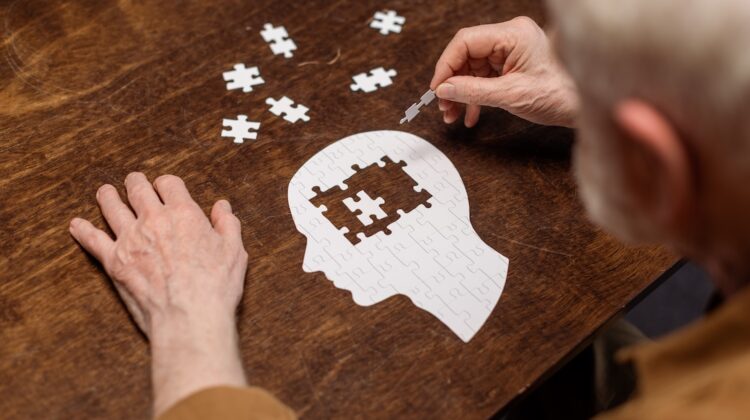
Photo credit: LightFieldStudios
Cannabis researchers are constantly trying to prove the plant’s place in medicine. From idolizing its anti-inflammatory properties to vilifying its potential for memory loss, cannabis is surrounded by polarity. However, the mass influx of credible research and FDA-approved synthetic cannabis drugs are breaking down the barriers that categorize THC as only helpful or harmful.
A clinical trial recently published by Johns Hopkins Medicine found evidence to support using synthetic cannabis to ease the suffering of Alzheimer’s patients. An unwavering disease, Alzheimer’s is a neurodegenerative disorder which experts categorize by an onset of memory loss, confusion, and inability to function in daily life.
Many may find these results surprising. Although premature cannabis consumption is linked to potential memory loss, in this situation it is not the memory being treated. Rather, Alzheimer’s patients are benefiting from synthetic cannabis to soothe agitation.
The study explains, “…researchers show that a pill form of the drug Dronabinol, an FDA-approved synthetic version of marijuana’s main ingredient, THC, reduces agitation in patients with Alzheimer’s by an average of 30%.”
Soothing Alzheimer’s Agitation With Cannabis
Alzheimer’s disease is the most common form of dementia. Currently diagnosed in over seven million Americans, it is detrimental to relationships and slowly renders the personalities of its victims unrecognizable. The primary cause of this is memory loss. But as the neurodegenerative disorder advances, victims also experience challenges with problem solving, judgment, withdrawal from social activities, and more.
Eventually, these symptoms build up to a point where Alzheimer’s patients cannot take care of themselves. Their freedoms are stripped away and suddenly, after decades of doing things on their own, they are left confused and frustrated.
Co-principal investigator of the study, Brent Forester, M.D., explains, “It is the agitation, not the memory loss, that often drives individuals with dementia to the emergency department and long-term-care facilities.”
Today, Alzheimer’s-related agitation affects 30% to 80% of patients. Experts most commonly treat it by using antipsychotics and antidepressants. But in this eight-year clinical trial, researchers used the synthetic cannabis drug Dronabinol to assess whether it could be as effective.
The study explains, “The researchers say that compared to current treatments for agitation, such as antipsychotics, Dronabinol produced similar calming effects without adverse results such as delirium or seizures.”
The Drug Dronabinol
In 1985 the FDA approved Dronabinol to treat anorexia associated with HIV/AIDs and chemotherapy-induced nausea. A synthetic form of THC, Dronabinol is a man-made cannabinoid. Whether synthetic or naturally-occurring, cannabinoids provide the same benefits.
Inside everybody, the endocannabinoid system (ECS) consists of endocannabinoids and cannabinoid receptors. These receptors use endocannabinoids (cannabinoids made by the body) to communicate with major organs like the brain and intestines to maintain homeostasis. Furthermore, external cannabinoids (those produced outside the body including by plants) such as Dronabinol provide the same effects.
A study from the American Journal of Geriatric Psychiatry journal explains, “When activated, CB1 generally reduces neuronal excitation. Dronabinol, like THC, is a partial agonist at the CB1 receptor. Cannabinoid signaling carries implications in many pathways, including pain modulation, cognition, appetite stimulation, anti-nausea, among others.”
Dronabinol is undoubtedly useful to combat a variety of ailments. In regard to Alzheimer’s-induced agitation, the synthetic cannabis drug communicates with the limbic system to regulate emotions, according to Cleveland Clinic. Whereas, antipsychotics combat agitation and psychosis symptoms but increase the risk of other negative side effects.
Dronabinol vs. Antipsychotics
When it comes to deciding on treatment for a patient or loved one, it is imperative to weigh the options. Those who are skeptical of synthetic THC or cannabis as a whole may prefer to treat Alzheimer’s-induced agitation with antipsychotics. This route is currently more common and has an added benefit of treating psychosis symptoms. However, the Johns Hopkins study states that compared to antipsychotics, Dronabinol is a safer approach. But above all, it is important to examine the individual’s pre-existing conditions and symptoms before committing to treatment.
First and foremost, Dronabinol and antipsychotics have entirely different ways of working in the body. In regard to antipsychotics, a study from Cochrane Library explains, “Almost all typical antipsychotics are antagonists at the dopamine receptor. Atypical antipsychotics also act as antagonists on muscarinic, serotonergic, adrenergic, and histaminergic receptors. These effects are considered to reduce agitation and psychosis.”
The study also notes that atypical antipsychotics are less likely to cause negative side effects. However, there are many avenues to consider when deciding on treatment. Those who lean towards nature-based remedies will prefer Dronabinol because cannabinoids are already present in everybody. Whereas, those whose primary goal is to reduce psychosis may prefer antipsychotics.
Antipsychotics treat a range of conditions like major depressive disorder, schizophrenia, bipolar, dementia and more. Clearly assisting in more than just agitation, it makes sense why antipsychotics are such a common prescription. The study also mentions a wide overprescription of antipsychotics, which come with a laundry list of potential side effects.
These side effects include strokes, falls, pneumonia, and further cognitive decline, according to the study. Dronabinol is a much less aggressive prescription compared to antipsychotics. However, some adverse effects like hypersensitivity, mental and physical impairment, and paradoxical nausea and vomiting can occur.
Nevertheless, adding Dronabinol to the arsenal of medications for treating Alzheimer’s has the potential to significantly improve the lives of patients and their caretakers. The Johns Hopkins research suggests that Dronabinol is a more holistic approach to easing agitation and in return, may make psychosis and loss of control more manageable.


Kim, Juyong, et. al. The Cannabinoids, CBDA and THCA, Rescue Memory Deficits and Reduce Amyloid-Beta and Tau Pathology in an Alzheimer’s Disease-like Mouse Model. Int J Mol Sci. 2023 Apr; 24(7): 6827. https://www.ncbi.nlm.nih.gov/pmc/articles/PMC10095267/